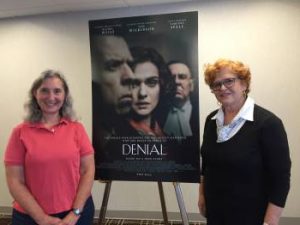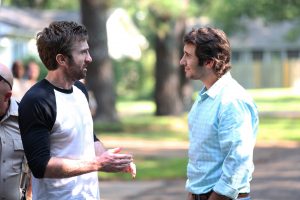I Am So Excited About the Return of The Gilmore Girls!
Posted on October 25, 2016 at 8:00 am
Posted on October 25, 2016 at 8:00 am
Posted on October 3, 2016 at 3:04 pm

In an interview, Professor Lipstadt talked about what we must do, at this moment when the last witnesses to the Holocaust are nearing the end of their lives, to make sure that the history is accurately communicated to future generations, and about the real basis for claims that the Holocaust did not happen. One way to tell the difference between those with intellectual integrity and those who try to suppress the truth is in their willingness to be transparent. Lipstadt has posted the entire trial transcript online so that anyone who wants to review the arguments and documentation has access to the entire record.
The film makes clear your frustration with the scope and procedures of the trial, which took place in London because British law is more favorable to plaintiffs in defamation suits. The standard of proof is different in a courtroom than it is in academia.
Historians reach proof by consensus. In academics we reach a consensus and we know that consensus might change but the proof we had to show in the courtroom is quite different. The lawyers and I agreed that the courtroom is not generally a place for history, to prove history but this was an exception to the rule in the way it structured itself, in the way we fought to have it structured.
People often say and I in fact said it for many years, “What’s going to happen, certainly in terms of remembrance in general but denial specifically, when there are no more survivors?” In a way our film is a testimony to the ability of documents to speak for what happened and to prove what happens. It took work, it took following the footnotes back to the sources and showing that when David Irving said, “I have a document that said that Adolf Hitler tried to stop the outbreaks from Kristallnacht and you look at the document, it doesn’t say that. It said, “Stop the arson.” What was happening is fire departments were saying that whole blocks are going up in smoke because you’re burning down the synagogue but it’s next to two buildings etc. etc. So Irving takes that one specific and makes it into a general. He takes a sequence of events, and he changes the sequence to make it look like what happened after really happened before. We brought k 25-30 instances of tracking Irving’s footnotes back to the sources and showing a distortion, an invention, a change of date, falsification, what Richard Evans from Cambridge called the tissue of lies.
It is one thing for a single outlier to make these claims, but I have been shocked at the number of people not just taking Irving’s views seriously but supporting his work.
Go to Amazon and look at the new edition of my book. Read the comments. You have the war of the words on the Amazon comments section. Once I wanted to delete and then I said no, they’re too valuable as a teaching tool.
In the movie your character wears very colorful scarves. Is that something that comes from you?
Yes, those are my scarves in fact that orange scarf I was thinking of wearing this morning is the one Rachel Weisz wears in the poster.
How does it feel to have Rachel Weisz playing you? I have to say she got your Queens accent very well.
Some people say oh, “The Queens accent is so overdone.” They clearly did not hear me speak, you know. You should hope and pray if they should ever make a film about you, that you get someone with the wellsprings of talent that Rachel Weisz has, and with the humanity, with the menschkeit and professionalism. She is a professional’s professional. She would call me up the night before and say, “Record this scene for me. Tell me how you would say this.” The scene in the lecture room where he is confronting me, she called me that morning before she was going to film. I was in Barcelona for a conference and she tracked me down. She said, “Deborah tell me what you were feeling, what was it like?” and I said, “Rachel, it was a horrible, horrible moment. I’m used to having as you know some measure of control, I was completely out of control… He was completely out of control. I didn’t know how to take charge of the situation. I saw the students looking and I was thinking maybe I have something to say if I started to challenge him it would elevate him. It was a debate I wouldn’t want to have. And yet I knew he was capturing the students and getting into their minds.” She stands there and she is standing her ground, saying, “I’m not going to debate,” you but you can see in her face that she knows she has lost in that setting.

It’s not just the Holocaust. Birtherism, Nine Elevenerism, Sandy Hook “truthers.” When David Hare sent me his original notes on how he was going to structure the screenplay, he sent me a memo 10/20 pages you know, on the cover there was a quote from Bertolt Brecht’s Galileo. I saw that and said, “We’ve got the right person.” That was very, very powerful to me. There are not two sides to facts, whether historical facts or science.
There are not two sides to every story. There are facts, there are opinions, and there are lies. If I will say to you, “It’s my opinion that the earth is flat,” you would say, “Get this woman help!” And you would say that’s not an opinion, that’s a lie parading as an opinion. What Holocaust deniers want is to provide a cover for racism and anti-Semitism. When David Duke when ran for governor of Louisiana he did not run wearing his bed sheets and Ku Klux Klan garb. You wear a suit and you look reasonable. Charles Murray wrote The Bell Curve; it’s racism parading as facts. David Irving brought a number of witnesses most of whom he had to subpoena to get them to appear. One witness who did not have a subpoena came of his own volition was a professor from Cal State Long Beach, who calls himself an evolutionary psychologist, and what he has written on Jews is just high-class anti-Semitism. He is not just an anti-Semite; he is a misogynist. His “testimony” was just a file folder of newspaper clippings about where I had appeared or given speeches, the groups I spoke to. This was to prove his theory of some conspiracy. And then, when it was our turn, the barrister defending me did not even ask a single question. The solicitor could see I was about to explode. He came to me and turned me around so my back was to the gallery so people couldn’t see me and he said, “Deborah, that was the right thing to do, if Richard had cross-examined him it would suggest to the judge that we thought he had some validity and the judge clearly thought he was worthless.” They were right.
What is behind these kinds of denials?
How come nobody asks George W. Bush or Bill Clinton to prove where they were born? Obama was born in Hawaii, which is not contiguous but it is a part of the United States. Why not make a fuss over Ted Cruz, who was born in Canada? It’s a form of racism. You and I know that. Parading as a rational kind of question, parading, masquerading. Holocaust denial is a form of anti-Semitism. You ask David Irving what motive the Jews would have to create such a widespread lie? And what he would say is a lot of what the Jews get out of the Holocaust is Israel and money. The Israel thing is not really historically true because it was really created 1945/46 because of British had to get out of their governing role in the region. And there would’ve been some Jewish entities there anyway; there were enough Jews living in Israel that there would’ve been something, but nonetheless that’s the popular perception. Well Israel and money speak right to the anti-Semitic stereotype of money and secret conniving power to accomplish their goals. They made up this myth so it fits right into the anti-Semitic template.
At its heart, Holocaust denial is a form of anti-Semitism. Anti-Semitism is a form of prejudice, think of the etymology pre-judged, I made up my mind, don’t confuse me with the facts. It’s utterly stupid, it’s utterly ludicrous but we fall into that trap. So that’s the point, the point is that well, how come David Irving believed that the Holocaust didn’t happen? It is the most documented genocide. I said it doesn’t make sense, I said then Holocaust does make sense, genocides does make sense. They do not believe it because the prism through which their view of the world is refracted is the anti-Semitic prejudicial conspiracy theory. The title of the movie reviews to denial in three senses: denial of the Holocaust, denial of reality and history, and then my denial of being able to speak.
Posted on September 28, 2016 at 9:49 pm

How did you first come upon the script?
I read the script on an airplane and immediately fell in love with it. I was laughing out loud, I was crying – people were looking at me, and I didn’t care. I fell for these characters, and saw my own family in the Hollars. I fell in love with the sincerity and love these people have for each other – in the midst of the chaos and dysfunction. It’s such a special story, and it fits right into the Sycamore ethos.
What matters most to you in the projects you commit to?
Any project we greenlight has to fit the ethos of our company. The Sycamore mission is to make films with elements of redemption, reconciliation, social justice, or what Andy Crouch calls the “full human condition.” We don’t ever set out to make blatantly Christian films – but I hope everything we do will have some type of positive impact on our culture and community.
What did John Krasinski bring to the film as director?
Everything. It was his passion that kept this project alive during development. It was his vision that attracted the cast. It was his charm, humor and sensibility that’s organically infused in every scene. And it was his leadership that everyone got behind, every step of the way. John is a very well-loved person, and people will come out of the woodwork to support him.
What do stories about loving but dysfunctional families help us understand about ourselves?
Well, I think everyone will relate to this film in some way. For me, it’s about grace. Family is everything to me, but it’s not always easy. Communication, honesty, forgiveness, love – those are all necessary. We all need to be more giving in those areas, because we all need it to be given to us. It’s grace in action. We’re all messy, we’re all broken – and we all try to pretend like we’re not. When a story like this comes along and shines a light on that – with a perfect blend of heart and humor – I think it inspires us to let down our own guard a little – take of our masks, so to speak – and trust ourselves and our loved ones with who we really are.

Josh and John are friends, and so Josh took the role when John reached out and offered it to him. Josh is perfect casting here. He brings such a likeable, calm yet authoritative presence to the role. He never has any passages of dialogue where he’s preaching – but his character has a strong impact on another character just by being patient and understanding with him – and this grace – there’s that word again – allows the other character to grow and change. It’s a beautiful and honest portrayal of a good man.
Although it is not explicitly a faith-centered film, how does it touch on matters of purpose and connection?
I really hope those discussions are about healing. How it’s never too late to make amends, or to grow closer without the burden of the past weighing us down. This is true in human relationships, and central to our relationship with God. We can meet God wherever we are in life, and He’s there for us. And I would hope everyone has someone in their life – a family member or friend – that embodies that. We are all built for community. We need each other, and this film is about our human need for those relationships in so many ways – especially familial.
Posted on September 19, 2016 at 8:00 am

The story deepens in the music-driven sequel to the global smash hit “Descendants,” as the teenage sons and daughters of Disney’s most infamous villains — Mal, Evie, Carlos and Jay (also known as Villain Kids or VKs) — try to find their place in idyllic Auradon. When the pressure to be royally perfect becomes too much for Mal, she returns to her rotten roots on the Isle of the Lost where her archenemy Uma, the daughter of Ursula, has taken her spot as self-proclaimed queen of the run-down town. Uma, still resentful over not being selected by Ben to go to Auradon Prep with the other Villain Kids, stirs her pirate gang including Captain Hook’s son Harry and Gaston’s son Gil, to break the barrier between the Isle of the Lost and Auradon, and unleash all the villains imprisoned on the Isle, once and for all.
To keep up with the latest on the sequel, follow this hashtag: #D2Deets
Posted on September 13, 2016 at 8:00 am